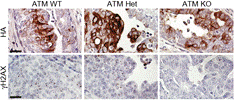Veterinary and Biomedical Sciences, Department of
Document Type
Article
Date of this Version
1-2016
Citation
Published in Journal of Proteome Research (2016), doi: 10.1021/acs.jproteome.5b01111
Abstract
Urine is a metabolite-rich biofluid that reflects the body’s effort to maintain chemical and osmotic homeostasis. Clinical diagnosis routinely relies on urine samples because the collection process is easy and noninvasive. Despite these advantages, urine is an under-investigated source of biomarkers for multiple sclerosis (MS). Nuclear magnetic resonance spectroscopy (NMR) has become a common approach for analyzing urinary metabolites for disease diagnosis and biomarker discovery. For illustration of the potential of urinary metabolites for diagnosing and treating MS patients, and for differentiating between MS and other illnesses, 38 urine samples were collected from healthy controls, MS patients, and neuromyelitis optica-spectrum disorder (NMO-SD) patients and analyzed with NMR, multivariate statistics, one-way ANOVA, and univariate statistics. Urine from MS patients exhibited a statistically distinct metabolic signature from healthy and NMO-SD controls. A total of 27 metabolites were differentially altered in the urine from MS and NMO-SD patients and were associated with synthesis and degradation of ketone bodies, amino acids, propionate and pyruvate metabolism, tricarboxylic acid cycle, and glycolysis. Metabolites altered in urine from MS patients were shown to be related to known pathogenic processes relevant to MS, including alterations in energy and fatty acid metabolism, mitochondrial activity, and the gut microbiota.
Included in
Analytical, Diagnostic and Therapeutic Techniques and Equipment Commons, Biochemical Phenomena, Metabolism, and Nutrition Commons, Medical Biochemistry Commons, Neurology Commons, Neurosciences Commons, Reproductive and Urinary Physiology Commons



Comments
Copyright © 2016 American Chemical Society. Used by permission.